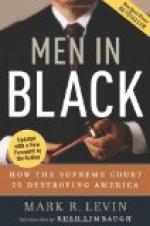“The question is perfectly proper; the witness ought to be permitted to answer it.” “No,” says the other lawyer, “it is improper in form, calls for a conclusion, and should not be allowed.” The judge looks puzzled. “Read that again,” he says. The question is, “What kind of a cow was it you saw in the plaintiff’s garden?” “I still object,” says the lawyer. “The witness has not been shown to be an expert. If my learned friend is going to attempt to qualify him as an expert, I desire an opportunity to cross-examine him concerning his experience in cows.” “Not at all,” answers the lawyer. “The question is entirely proper and I stand on my legal rights.” The judge hesitates; if he does not rule correctly the lawyer will take an exception and the Appellate Court may not like it. So he says, turning to the witness, “You may answer, but I will reserve the question and decide it later on a motion to strike out.” “I except,” says the lawyer. The jury look relieved. The witness straightens up, the opposing lawyer sits back in disgusted contempt at such a loose method of procedure. “Well,” says the witness, “it was a red cow.”
This may go on for some time.
“I move to strike the answer out,” says the lawyer; and the argument begins all over again.
Throughout the trial the client and the jury are waiting for these objections and exceptions. The nature of an exception is a notice served on the judge that his rulings are wrong. The theory is that if he wants to change them he had better do so before the case goes to appeal. It is a covert threat to the judge. There is a principle in some courts that no ruling that is not excepted to can be considered on appeal; consequently a lawyer is careful to preserve his rights by exceptions.
A young lawyer once had this principle so firmly fixed in his mind that when he went to court he began taking exceptions to everything, even rulings in his favor. He would make an objection; the judge would sustain it. “I except,” said the lawyer. He would make a motion; the judge would grant it. “I except,” said the young lawyer. The other side would make an objection; the judge would rule against them and in favor of the lawyer, “I except,” said the lawyer. Finally the situation grew so strained that the judge called the young man to the bench and spoke to him confidentially. His explanation was: “This is my first case and the head of my firm told me to be sure and take exceptions to all rulings.”
Some lawyers are so in the habit of excepting, it sounds as though they were hiccoughing. “Overruled”; “I except”; “Allowed”; “I except”; “Denied”; “I except”; “Granted”; “I except.” It becomes a custom as constant as the refrain in a comic opera.
Theoretically it may have a sound basis under the law, but so little practical value has it that it seems ludicrous. The lawyers and the judges consider it a matter of course. If the judge after all the argument finally decides to let the testimony as to the red cow stand, he will not be inclined to change his mind because the lawyer interjects that threatening exception. The sound of the word is spiteful and seems to express the resentment of the lawyer at the ruling of the judge.




